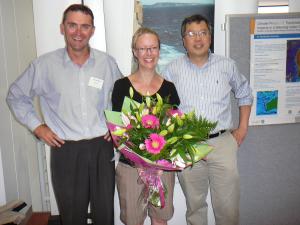On 9 February 2010 the Western Australian Marine Science Institution and the Australian Marine Sciences Association WA branch held the Marine science in Western Australia: Show and tell symposium. Over 230 researchers attended the Western Australian Maritime Museum at Fremantle.
More than 100 two-minute ‘newsflash’ presentations by scientists from government, academia and private industry gave an outline of most of the State’s marine research now occurring in the Kimberley, Pilbara, Gascoyne, Perth, the South West and the South Coast.
The newsflashes were spearheaded by summaries of Western Australian Marine Science Institution (WAMSI) research results in six key areas – ecosystems, climate change, Ningaloo Marine Park, fisheries, biotechnology and oceanography.
WAMSI Chief Executive Officer Steve Blake said marine research was a vital prerequisite to answer questions about the survival of coral reefs, climate change, the future of marine species, food webs, fisheries, tsunamis, extinctions, warming temperatures and ocean acidification.
Speakers discussed the dazzling array of new corals being discovered in the Kimberley region, the presence of heavy metals, tsunami warning systems, ocean temperature and current speed forecasting, the impact of coastal developments, fisheries biology, social uses, dredging of ports, the discovery of new sponges, environmental pests (there are 55 known to impact WA waters), monitoring estuaries, and how particles and larvae are being distributed by the Leeuwin Current.

